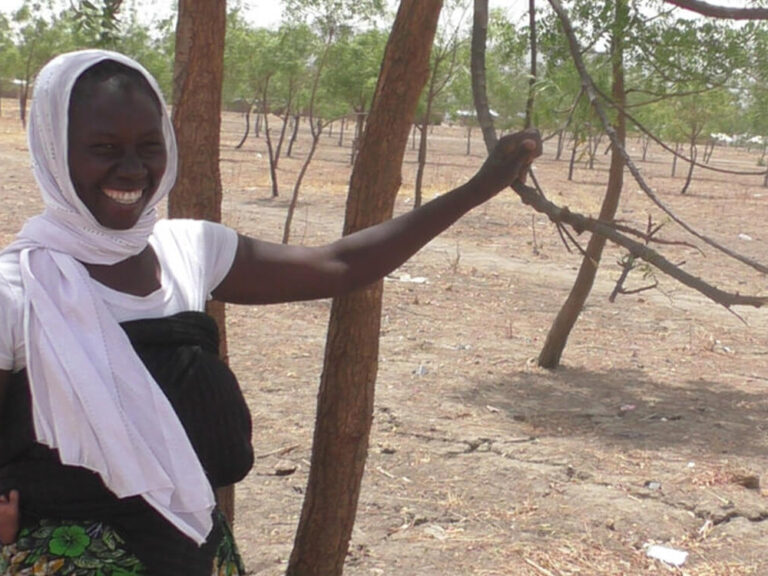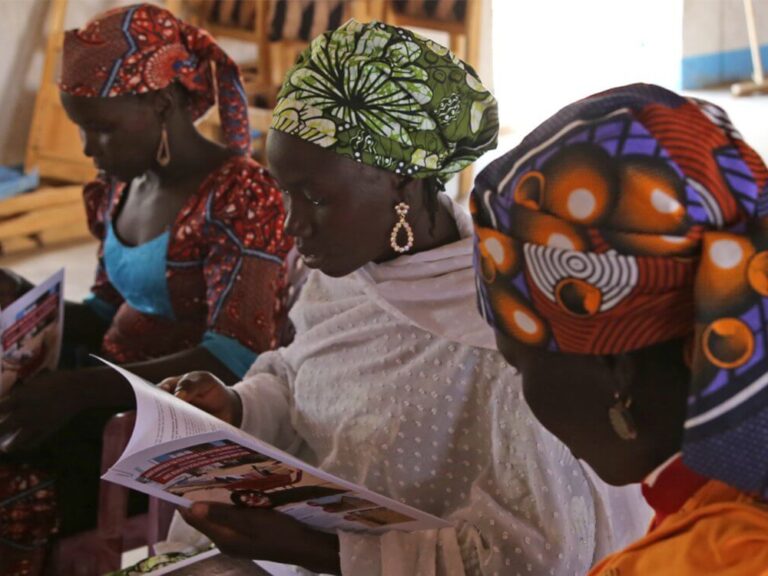With her baby in her arms, 29 year-old Kaltoumi fled to Cameroon in 2014, after extremist group Boko Haram made repeated attacks on her village in Borno-State, Nigeria.
She has made Minawao Camp her home, alongside tens of thousands of other refugees. We visited Kaltoumi several times over a 6 month period to hear her story.
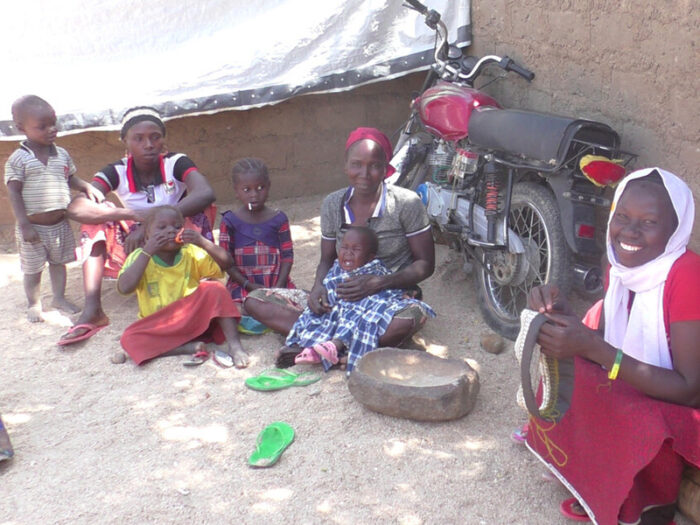

Life before Minawao Camp
Kaltoumi is originally from a village in South-eastern Nigeria, in Borno-state. Born, raised and married in Nigeria, Kaltoumi had never dreamed of leaving her peaceful home to settle elsewhere.
Married at 18, Kaltoumi’s future was planned from early adolescence. Kaltoumi’s husband built her a modest house; “at that time there were only three of us so we had a huge house by ourselves”, shares Kaltoumi. “We were really comfortable in that house.”
She would spend her days going to the field with her husband, caring for her baby and making hats. She hoped to expand her family and send her children to school so they’d have a fulfilling and bright future.
Kaltoumi continues to nurture these dreams, despite the fact life has given her challenges she never imagined.
Three years ago, Kaltoumi was going about her usual business with her older daughters who were helping her with chores. Everything seemed normal, until a shrill cry startled them all. Kaltoumi jumped up to see what was happening. The field was completely surrounded by armed men.
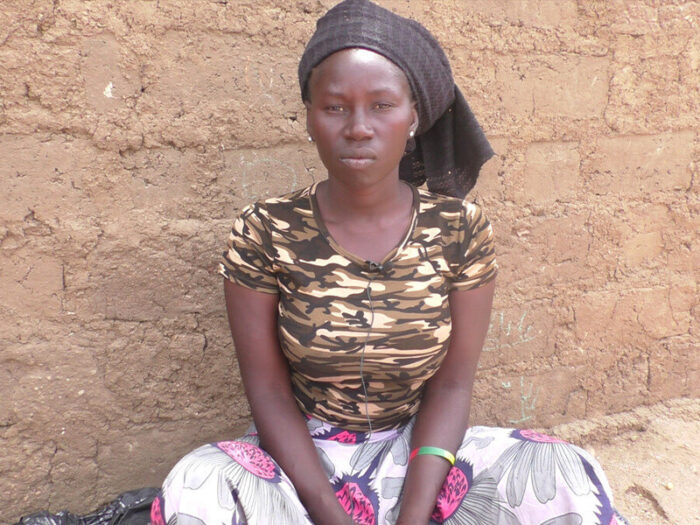
Boko Haram attack
Kaltoumi’s village had long been plagued by multiple attacks. In 2014, Boko Haram were frequently attacking people in Borno-state.
“We were all living with fear in our stomach” shared Kaltoumi. She recalled hearing an explosion and seeing people run in all directions, her husband shouting to gather what she could and run with the rest of the villagers.
“With other women, we then formed a few small groups to escape: women, children and the elderly on one side, few men on the other. Men were even less fortunate than we were to get by; they could put up resistance but most likely ended up dead. That’s when we began our journey to the unknown. We were not planning to get to Cameroon and settle there, but it is where God finally led us.”
Arriving in Minawao Camp
Eight years ago, Kaltoumi arrived in Cameroon without a penny and with an infant in her arms. She was fortunately reunited a few weeks later with her husband, who survived the vicious attack.
The camp was very different to home, and Kaltoumi was very quickly faced with the harsh reality she was in.
The first few months in a camp constantly remind people of what they have lost, what they might never have again, and the challenges they still must go through. The biggest difficultly for many is to regain independence when most have no source of income.
“The most striking fact that seriously disadvantaged me when I arrived at this camp was my dependence on others, and mainly NGO’s.”
Since arriving in the camp, Kaltoumi has understood that her life is now in Minawao. She has rebuilt her life, far from Nigeria, far from her roots.
Her family has grown to include three more children. She now feels integrated into life in the camp, she has set up her home as if she were still in her village, and created a daily routine. Kaltoumi also rents a piece of land to carry out farm work, where she cultivates vegetables and peanuts to eat or to sell when they run out of money.
Kaltoumi shares that one of the things she has learnt is to seize the opportunity to live, to make her home beautiful.
“I appreciate every single moment I spend with my friends in a friendly and security atmosphere. I haven’t had a moment of insecurity yet since I’ve been living here.”
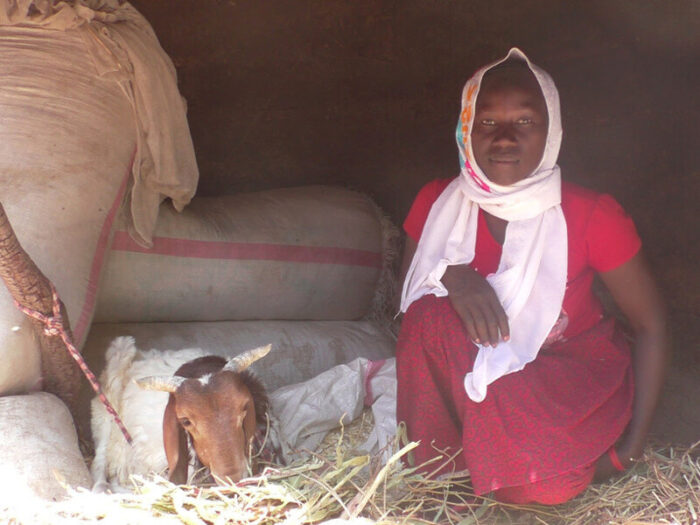

Dealing with food scarcity
A challenge upon arriving at the camp was dealing with food scarcity. Kaltoumi’s family received rations, but they weren’t enough.
Being business minded, Kaltoumi and her husband thought of ways to increase their income. With their savings they bought a sheep, which they will raise and resell later.
“Livestock farming has always been the activity I dream about the most. I always wanted to have my own cattle. It’s easy to resell them and it provides constant savings. I saved up and we were able to buy a sheep. Once it is grown, I will resell it. It was a great joy for me to acquire it, I fulfilled one of my goals.”
Dealing with severe weather
Over the 8 years Kaltoumi has lived in the camp, she has seen it go through many environmental phases. The camp was green with many trees when she first arrived, but it’s now dry and sparse due to deforestation.
Each year inhabitants suffer due to the intense heat, and the extreme cold in the early mornings.
Drought is a great concern to those living in the camp, and it can be very difficult to adjust to the very high temperatures. Kaltoumi’s children have been sick several times due to severe heat, especially when there is a water deficit. Her children often suffer from dehydration, fever or malaria.
To make matters worse, droughts negatively impact agricultural production leading to famine.
As for the rainy season, flooding regularly damages shelters and roads in the camp, and people have drowned in floodwater.
Kaltoumi shared, “The best way to cushion some of the effects of climate change, in my view, is through reforestation, and we are thinking about that. I believe within two years Minawao will have an impressive flora. The community has also thought about installing boreholes that operate with solar plates, and a formal ban on cutting down trees in Minawao and its surroundings.”
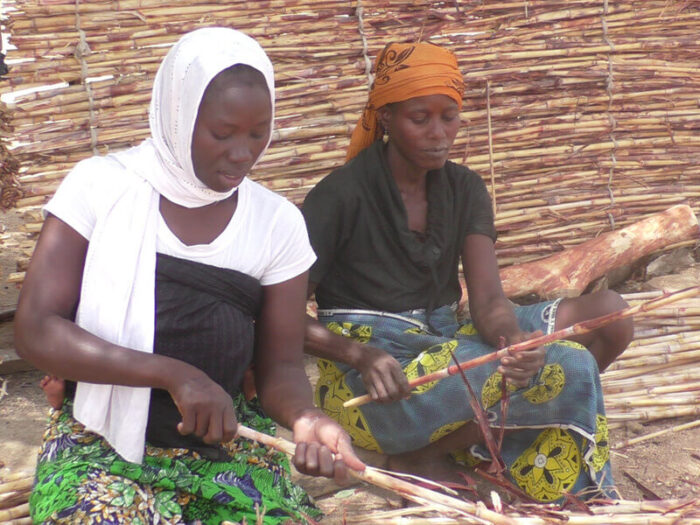

A sense of community
One of the characteristics of Minawao is bringing people from different cultures together, to strengthen the bonds of solidarity, hospitality and sharing. Bonds as strong as those of a family are formed between individuals.
The neighbourhood and community are often called upon to support community actions, such as constructing shelters and the development of basic necessities like water points and toilets.
Kaltoumi shares a close friendship with two young housewives who arrived at the camp around the same time as her. They shared the same difficulties and formed a friendship marked by fraternity, trust and mutual help.
All Minawao residents have one thing in common; they are survivors. Solidarity remains the glue of the community life in the camp.
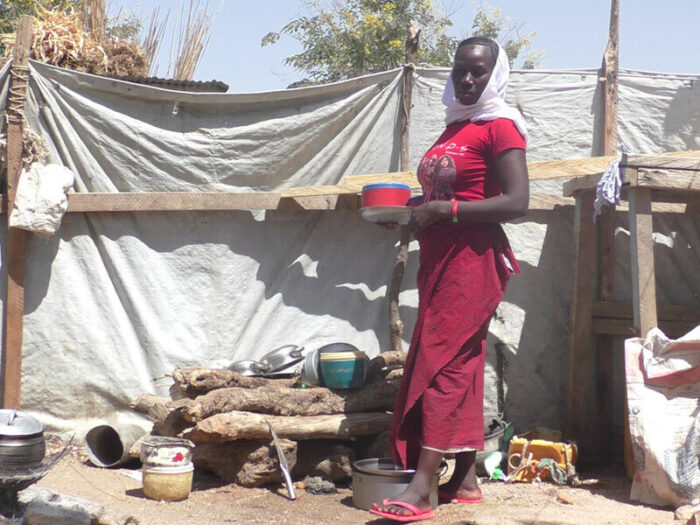

ShelterBox support
“When I arrived at Minawao camp, the first items I received came from ShelterBox. I was given a tent that later got damaged, then a second one was provided to me.”
“I have also received household items, a rope and a tarpaulin. These aid items were essential for me to regain my autonomy and get back on my feet. I lived in the tent for more than a year. I used my household items for a long time.”
Once provided with a tent, Kaltoumi was able to move out of the transit centre, a communal area where people lived before they are relocated in the camp. Kaltoumi felt supported and relieved from her anxiety.
She embraced her shelter as her new type of home; a home where she told us she felt safe from extreme weather, safe from insects, scorpions or snakes.
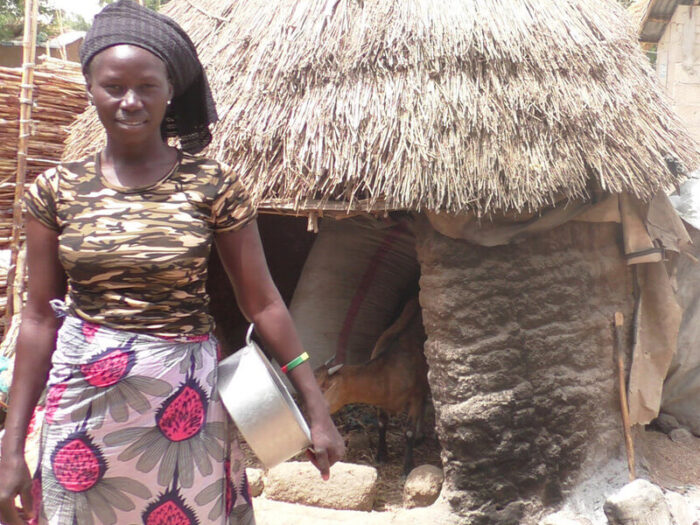

Building a home for her family
Since early 2022, Kaltoumi has owned a house made of bricks, built by a team of workers and her husband. Her home represents her greatest achievement at the camp and a great pride for her to talk about.
Using the tarpaulin provided by ShelterBox, they created a roof for their home. “This house represents my refuge during inclement weather, I feel safe and I am very proud of it.”
Anyone who has a semi-durable shelter has the goal to cover it with a tarpaulin and, eventually, replace that tarpaulin with metal sheets, which have a much longer life span and provide protection during the rainy season.
This is the current project that Kaltoumi wishes to achieve for her home.
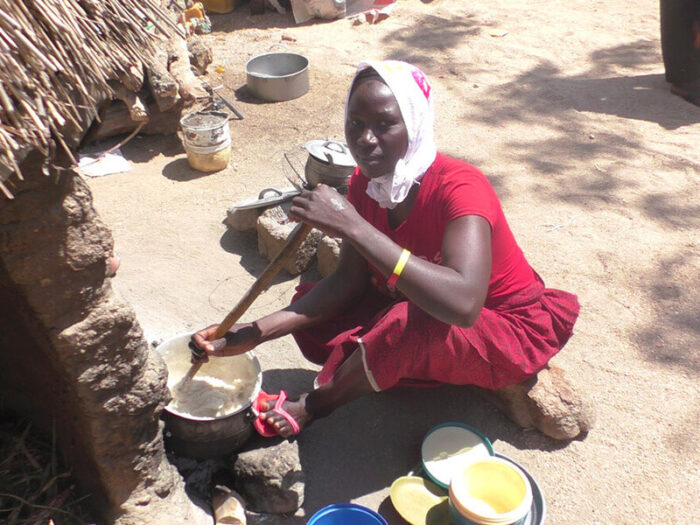

Remembering home
“I remember that my life was enjoyable back home; I never slept on an empty stomach, I visited my parents regularly and I had many friends. I grew my own food that I was able to resell for some money; I could go fishing and eat fish whenever I wanted. I had everything to be happy.
What I appreciated the most about my old life was probably my business which was prosperous as well as my pretty traditional clothes. It all seems so far away now.
I already feel like I’ve spent my whole life here because five of my children were born in Cameroon and thus have Cameroonian nationality. I don’t know if I will ever go back to Nigeria; it would be starting life all over again and I’m not ready to repeat that experience.”
Looking to the future
Despite their many challenges, Kaltoumi and her family stay positive. Today, she is a mother of six children, who enjoy school and are in good health, and who have a secure home.
They acquired a plot of land on which they grow crops, and plan to develop their business.
Kaltoumi aims to start commercial activities like selling soap, salt, spices and good products, and will continue her other activities such as livestock and agriculture. She envisions herself a year from now behind the counter of her business, selling her products.
Her family has found peace and security at the camp after 8 years, and she can no longer see herself living anywhere else.
Kaltoumi envisions a bright future for her children; “I will do everything in my capacity to get my children into secondary school. With their diplomas, they will be able to find a good job and have a perfect life.”
Kaltoumi concluded the interview by saying, “I would only encourage ShelterBox in their task which is admirable; I lived a respectful life thanks to their kindness and I am deeply grateful for that.”

